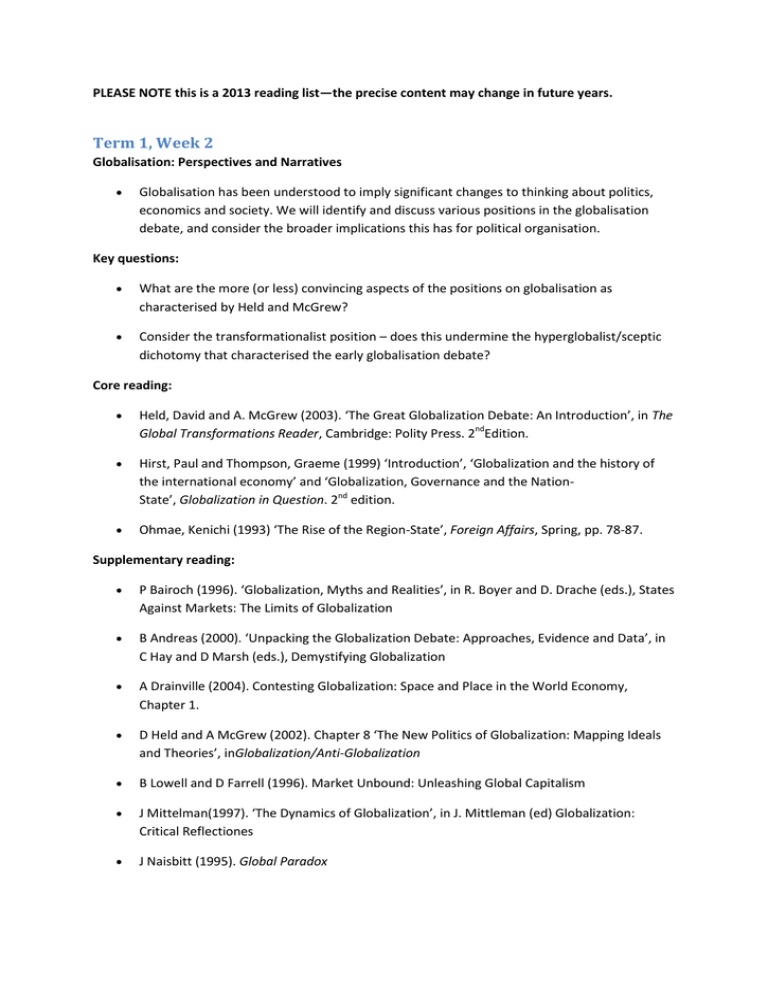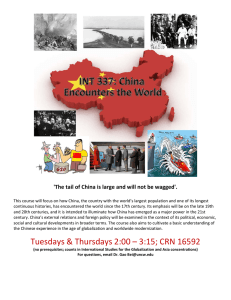Term 1, Week 2
advertisement

PLEASE NOTE this is a 2013 reading list—the precise content may change in future years. Term 1, Week 2 Globalisation: Perspectives and Narratives Globalisation has been understood to imply significant changes to thinking about politics, economics and society. We will identify and discuss various positions in the globalisation debate, and consider the broader implications this has for political organisation. Key questions: What are the more (or less) convincing aspects of the positions on globalisation as characterised by Held and McGrew? Consider the transformationalist position – does this undermine the hyperglobalist/sceptic dichotomy that characterised the early globalisation debate? Core reading: Held, David and A. McGrew (2003). ‘The Great Globalization Debate: An Introduction’, in The Global Transformations Reader, Cambridge: Polity Press. 2ndEdition. Hirst, Paul and Thompson, Graeme (1999) ‘Introduction’, ‘Globalization and the history of the international economy’ and ‘Globalization, Governance and the NationState’, Globalization in Question. 2nd edition. Ohmae, Kenichi (1993) ‘The Rise of the Region-State’, Foreign Affairs, Spring, pp. 78-87. Supplementary reading: P Bairoch (1996). ‘Globalization, Myths and Realities’, in R. Boyer and D. Drache (eds.), States Against Markets: The Limits of Globalization B Andreas (2000). ‘Unpacking the Globalization Debate: Approaches, Evidence and Data’, in C Hay and D Marsh (eds.), Demystifying Globalization A Drainville (2004). Contesting Globalization: Space and Place in the World Economy, Chapter 1. D Held and A McGrew (2002). Chapter 8 ‘The New Politics of Globalization: Mapping Ideals and Theories’, inGlobalization/Anti-Globalization B Lowell and D Farrell (1996). Market Unbound: Unleashing Global Capitalism J Mittelman(1997). ‘The Dynamics of Globalization’, in J. Mittleman (ed) Globalization: Critical Reflectiones J Naisbitt (1995). Global Paradox J Nederveen Pieterse (2000). ‘Shaping Globalization’, in J Nederveen Pieterse (ed) Global Futures: Shaping Globalization Negroponte, Nicholas (1995). Being Digital New Internationalist, Special Issue on ‘Globalization, no. 296, November 2001. http://www.newint.org/issue296/contents.html Ohmae, Kenichi (1995). The End of the Nation-State: The Rise of Regional Economies, Ohmae, Kenichi (1990). The Borderless World Reich, Robert (1992). The Work of Nations: Preparing Ourselves for 21st Century Capitalism Rosenau, James N. (2001). ‘The Dynamics of Globalization: Toward an Operational Formulation’, in Higgott, Richard and Anthony Payne (eds.), The New Political Economy of Globalisation, vol. 1, Cheltenham: Edward Elgar. Ruigrok, Winfried and Van Tulder, Rob (1995). ‘Introduction: Appraising three major debates’ in The Logic of International Restructuring, London: Routledge. J.A Scholte (2002). ‘What is Globalization? The definitional issue – again’, CSGR Working paper no. 109/02, December. Available at http://www.warwick.ac.uk/fac/soc/CSGR/wpapers/wp10902.pdf J Tomlinson (2003). ‘Globalization and Cultural Identity’, in The Global Transformations Reader. R Wade (1996). ‘Globalization and its Limits: Reports of the Death of the National Economy are Greatly Exaggerated’, in S Berger and R Dore (eds.), National Diversity and Global Capitalism, pp. 60-88. Also Chapter 5 in R Higgott and A Payne (eds.), The New Political Economy of Globalisation (2001),so ny d yo read the n Debate: An lobalisation debate.to inform us in regard to th vol. 1. M Waters (1995). ‘Brave New Worlds: Recent Theories’ and ‘What on Earth is Happening?’, Globalization (1stEdition) M Waters (2001). Globalization, Chaper 8. J Zysman(1996). ‘The Myth of a “Global” Economy: Enduring National Foundations and Emerging Regional Realities’, New Political Economy, 1(2), July, pp. 157-84.




